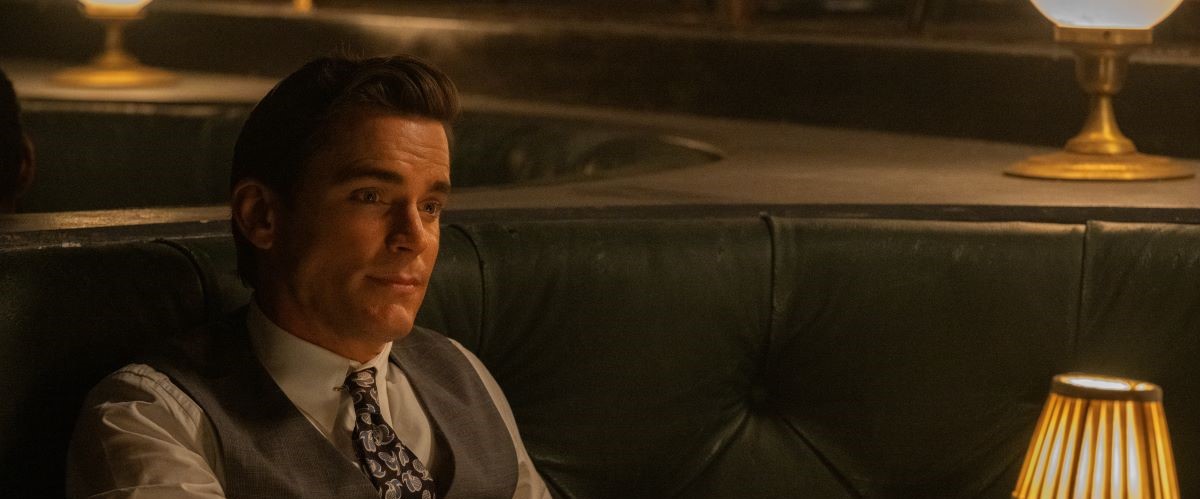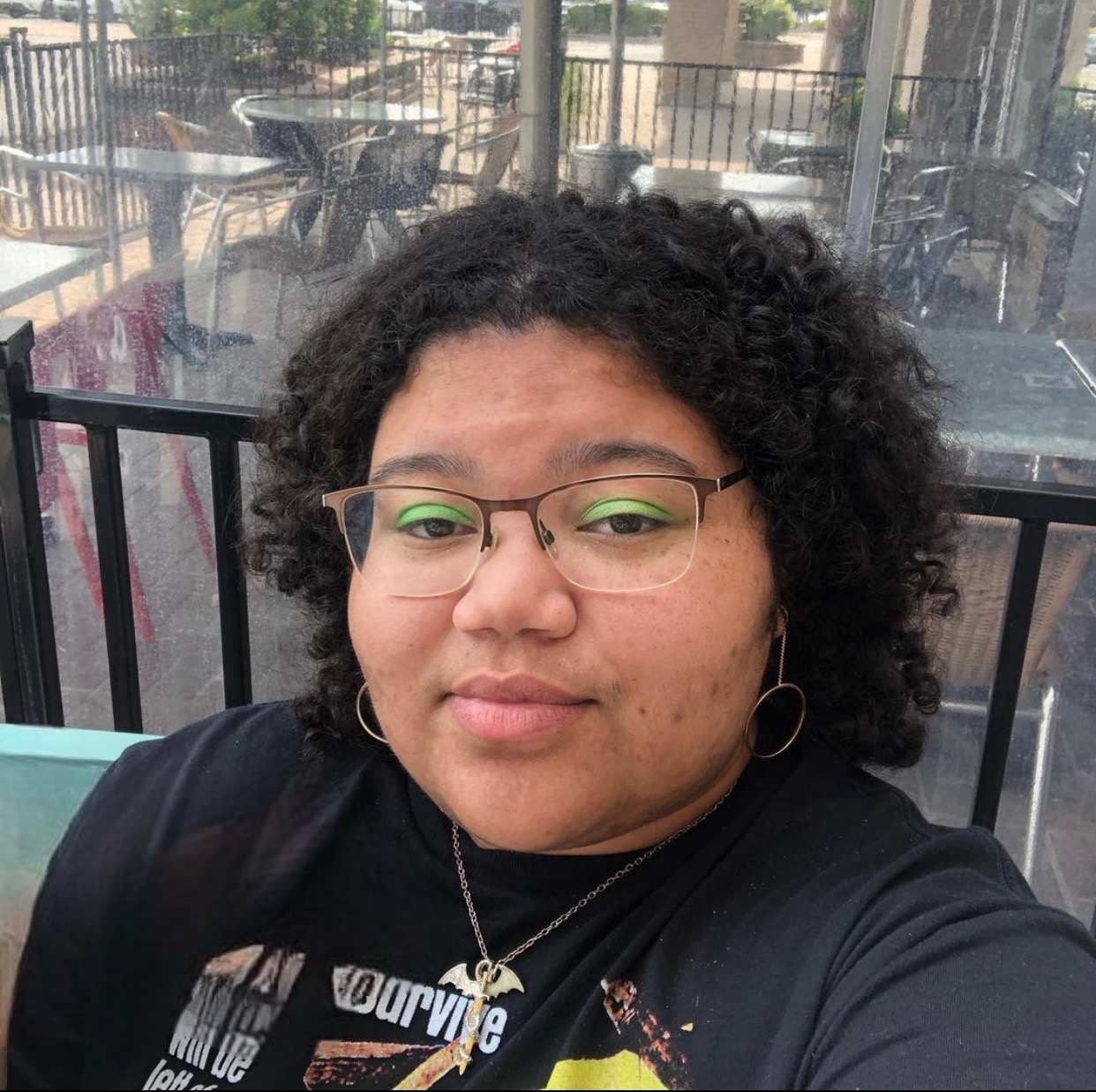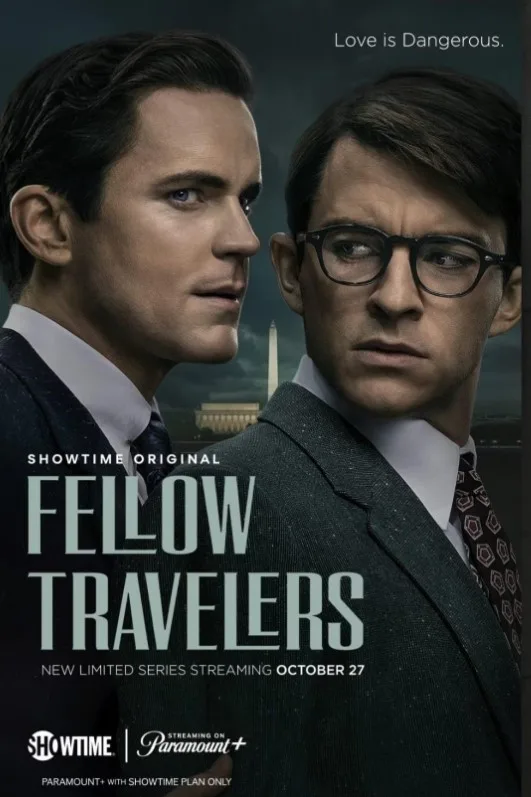We’re first introduced to Hawkins Fuller (Matt Bomer) during a going away party in the mid-1980s. He looks weathered, tan spots doting his temples along with sparse gray streaks, a smile plastered on his face so tight that it appears uncanny. He graces the party with a rehearsed familiarity, greeting guests before posing with a cake and his wife, daughter, and grandchild. He makes the perfect picture of a man who achieved the American dream until he turns his head and spots an old acquaintance whose presence could shatter all he’s built.
Marcus Hooks (Jelani Alladin), an old flame and friend, tells Hawk that a man named Tim (Jonathan Bailey) has requested that he give Hawk an old gift. If the ’80s fashioned hairdos weren’t enough to point to the show’s current period, mentions of Tim settling his affairs and the question of “How bad is it?” point to an AIDS diagnosis, which we later find Tim suffers from. Marcus leaves, but not before uttering, “You have a beautiful family. A beautiful life. I hope it was worth it.” Then, we are transported back to 1952, where Hawk and Tim first meet. They subtly flirt back and forth at a party before parting ways, but the gazes they leave upon each other’s faces prove that this won’t be the last time they meet. This brief moment sparks both parties’ decades-long pursuit of love and belonging.
Adapted from the 2007 novel of the same name, “Fellow Travelers” truly begins once the show turns back the clock and focuses on Tim and Hawkins’ initial meeting. From there, it becomes clear how different Hawk’s life in the 1950s is from his life in the 1980s. His happy and heterosexual life that we’re first introduced to is juxtaposed with a life that appears firmly routine. He goes to work as a State Department Official, his office dark and dreary, before leaving to meet an unnamed man to have sex with. No one accompanies him afterward on the dark walk home.
Finally, Hawk and Tim meet again in a park, where Hawk seems enamored with Tim’s drive to break into politics to do good. He finds Tim a job as a junior assistant, where his optimism soon becomes a point of contention between the two. They quickly begin a relationship filled with sex and, slowly, feelings. Yet, their differences of opinions and emotional maturity soon become a point of contention, as does their positions as gay men working in the government during the Lavender scandal era. From a deep scar on Hawk’s shoulder blade to reservations about his true politics, Tim realizes they may not understand each other beyond their physicality.
“I just wanna know you,” Tim utters one night as the two lay in bed together, to which Hawk replies with a grin that Tim does know him. To Hawk, sex is a means of knowing, but to Tim, sex cannot be where a relationship begins and ends. They are different people, which becomes even more apparent when Tim befriends a woman from work who happens to be a lesbian. Finally, amongst other queer people, Tim sees what life can look like for him. The power of community becomes an important thread as we’re transported off and on to the 1980s, where Tim is taken care of by Marcus and his drag queen-turned-activist boyfriend Frankie (Noah J. Ricketts) and a slew of others. In his dying months and weeks, community is the thing that keeps Tim going. Knowing that there are people who care for him and take activism and queer life as seriously as he does gives him a well-needed boost.
On the other hand, it appears that Hawk has become even more solitary over the years. His wife Lucy (Allison Williams) seems to know less about him than Tim, and he and his son have an even rockier relationship than Hawk and his own father. For him, this absence of community has led to a life devoid of joy. He continues to hide and, in doing so, continues on a path toward darkness that he may be unable to escape. As the decades pass, and tragedy continues to strike both men, Hawk becomes the one who needs taking care of, and it’s in the drug-fueled, disco-hued backdrop of the 1970s that Tim and Hawk become the closest they may have ever been.
While there’s no doubt that Tim remains the heart of the show, thanks to stellar work by Bailey, Matt Bomer does his best work in years as Hawk. From the first time we see his uncanny smile and threatening aura when people stand in his way, Bomer commands the screen. It’s impossible to look away from him or be unmoved by his prowess, glares so piercing it almost feels as if he’s gazing through the screen. Beyond his anger and his aptness for deceit, Hawk has a deep-rooted sadness that only comes out in later episodes and that Bomer conveys with staggering ease.
“Did you come here for forgiveness?” Tim asks Hawk at one point early on in the series, and it does seem so for the first few episodes. Tim is more affectionate and longs for their relationship to feel real, which doesn’t seem to bother Hawk. But, as the story unfolds, it becomes clear that while Hawk doesn’t initially show it, he too is affected by the imposed secrecy their relationship faces. He appeases Tim in small ways, even gifting him cufflinks with his initials, proving he, too, values their bond. To Hawk, these cufflinks are a way for him to let the world know that Tim is his, though it’s more unofficial than an engagement ring. Though they may not be able to exist like heterosexual couples, in Tim accepting this gift to show that he belongs to Hawk, the two can bond even more intimately.
The link between queerness and sex is intrinsic, and the creators of “Fellow Travelers” thankfully wholly understand this. From the first sex scene between Tim and Hawk, where their bodies harshly clash, to later sequences where their skin melds together like liquid gold amongst white sheets, the intimacy here is striking. Unlike certain peers in the queer sphere of cinema and television, the show looks at queerness with unwavering honesty, which makes the sex scenes almost staggering. There’s a brief sequence in episode seven, where Hawk and Tim navigate a gay cruising spot in the 1970s, that fully showcases the care of the show’s creators. As they walk through the trees, glimmers of different bodies peek through the forest, the sun shining through and beaming off their skin as if the two are in a biblical garden.
Each body is displayed as if every blemish is important, as is each conversation between the show’s characters. While some miniseries feel bloated with all they attempt to cover in such short episodes, no minute is wasted here. Even Marcus and Frankie, though they are supporting characters, add emotional weight to the adaptation’s themes of ostracization outside and within the gay community. From bar raids to secrets and deception, each aspect of living in the dark bears a heavy weight upon the shoulders of each character, a weight so burdensome all of them eventually crumble underneath it.
Hiding and staying hidden may be the most present theme, but every thread remains intentional and essential. Through each decade we witness, this is a story about the complications of guilt and love and how each manifests differently for different people. The love between Tim and Hawk is never confused or abandoned for another plotline but woven into the show’s other themes expertly. This is one of the best miniseries of the year.
All eight episodes were screened for review. “Fellow Travelers” premieres on Paramount+ on October 27th and Showtime on October 29th.




















